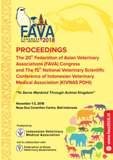EQ-2 Establishment of Equine Disease Free Zone (EDFZ) in Jakarta to Facilitate the Equestrian Competitions During The 18th Asian Games, 2018
Abstract
The 18th Asian Games, which include the Olympic equestrian disciplines of jumping, dressage and eventing, were held in Jakarta from 18 August to 2 September 2018.
Equestrian sport in the Asian region is well developed in only a few countries and, in general there is little agreement between the member nations of the region about animal health regulations for horse movement between these countries. Few countries are approved for reentry of horses that have visited them to the European Union (“approved third countries”), hence making it difficult for Europe based Asian horses to travel to and to return from some countries in the region. Indonesia is one of the countries with no approval.
In order to facilitate competition horse movement to specific international events, the World Organisation of Animal Health (OIE) has developed the concept of Equine Disease Free Zone (EDFZ), which is based on the fundamental principle of zoning and compartmentalisation as defined in the OIE Terrestrial Animal Health Code (Chapter 4.3, 4.4).
The basic principle of EDFZ is to demonstrate that the equine health of a defined core zone and its surroundings have high health standards which are acceptable to the trading partners. The stepwise approach taken in Indonesia consisted of (1) an assessment of the equine health status and the identification of critical diseases; (2) the definition of a core zone (the venue) and a surveillance zone; (3) the application of biosecurity measures and protocols; (4) international and national health certificates, specifically developed for the Asian Games; (5) a self declaration of the EDFZ submitted to the OIE; and (6) acceptance and publication of the application for regionalization by the European Commission. If both of these applications are approved, participating nations can be reassured that sanitary conditions at the equestrian venue have met the international standards as set by the OIE and the EU.
